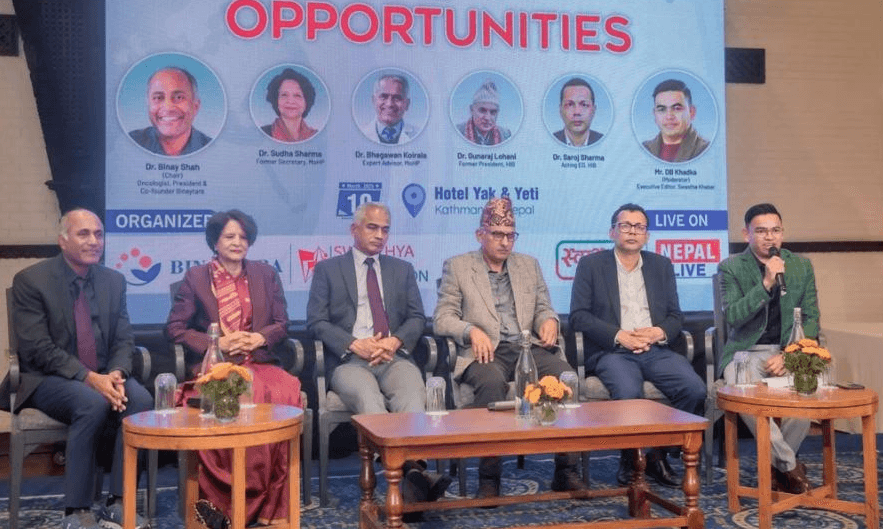Binaytara Hosts Landmark Policy Debate on Health Insurance Reform in Nepal

Author
Binaytara Team
Kathmandu, Nepal — On March 10, 2025, Binaytara, in partnership with the Swasthya Khabar Foundation, convened a pivotal policy debate titled “Health Insurance in Nepal – Current Challenges and Opportunities” in Kathmandu. The event brought together healthcare leaders, policymakers, and stakeholders to address systemic gaps in Nepal’s health insurance framework and chart a path toward equitable universal health coverage.
Key Discussions and Consensus
Panelists, including Dr. Bhagawan Koirala (Health Insurance Reform Task Force), Dr. Guna Raj Lohani (former Health Insurance Board Chair), Dr. Sudha Sharma (former Health Secretary), and Dr. Saroj Sharma (Ministry of Health), called for urgent reforms to Nepal’s current health insurance model. Central to the debate was the need to revise the existing premium structure (Rs. 3,500 for Rs. 100,000 coverage).
Dr. Guna Raj Lohani stressed, “To operationalize the current package, premiums must rise to at least Rs. 8,000, with the state subsidizing Rs. 4,500. Without this, the Insurance Board cannot meet demand.” Dr. Saroj Sharma proposed innovative funding mechanisms, including heavy taxes on tobacco, alcohol, and sugar, with revenue directed to the insurance fund.
Government Commitment and Structural Challenges
Dr. Bikash Devkota, Secretary of the Ministry of Health and Population, endorsed the panel’s conclusions, emphasizing the need for tiered premium packages (e.g., Rs. 3,500, Rs. 5,000, Rs. 10,000) to expand coverage for outpatient and surgical services. He acknowledged the narrowing funding avenues, stating, “The state must either subsidize premiums or identify new revenue streams.”
Parallel Programs: A Barrier to Progress
Experts highlighted duplication caused by overlapping government initiatives, such as the Social Security Fund and Citizen Investment Fund, which create confusion and dilute resources. Dr. Lohani urged alignment with the Health Insurance Act, emphasizing inclusion of the formal sector and income-based premiums. Dr. Koirala added, “Consolidating all welfare programs under health insurance could generate a Rs. 95 billion fund, ensuring sustainability.”
Healthcare Disparities and the Road to Equity
Dr. Binay Shah, Binaytara co-founder and president, underscored stark provincial disparities revealed in the 2022 Nepal Demographic Health Survey. “Maternal and child mortality rates in Far West, Madhesh, and Karnali provinces, coupled with unequal access to public health services, demand immediate action,” he stated. While applauding the Health Insurance Board’s commitment to universal coverage by 2030, Dr. Shah stressed that bridging these gaps requires a robust, inclusive insurance system.
Conclusion
Binaytara reaffirms its dedication to advancing equitable healthcare access through policy advocacy and collaboration. The leaders and stakeholders in the government of Nepal are demonstrating a commitment to improving health insurance policy for its citizens and Binaytara looks forward to improvements and greater collaboration in the near future. This debate marks a critical step toward reforming Nepal’s health insurance landscape, ensuring quality care reaches all citizens, regardless of geography or income.